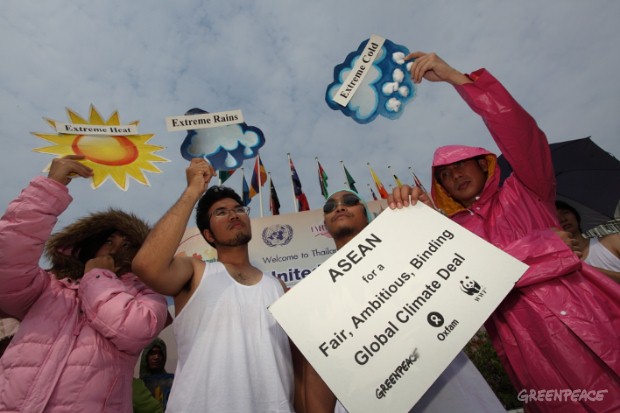Ladies and gentlemen, welcome to Thailand for yet another round of Climate change negotiations at the UN climate change conference to be held in Bangkok between April 3-8, 2011.

We hope that the front page headlines of local newspapers of the unfolding disaster in Southern Thailand grab your attention and we hope that despite the recent UN directive relaxing dress codes at the meeting (no more stuffy suits), you are carrying a cardigan to keep you warm in the unexpected cold wave that has gripped this city.
For lot of ordinary Thai citizens, in fact all people in the ASEAN region, climate change is neither a debate, nor a war between science and opinion, but a reality, and they are getting increasingly aware of how vulnerable and unprepared they are to its impacts.
At the debacle at the 2009 UN meeting in Copenhagen, world leaders missed a chance to take decisive action on climate change and lost the momentum built by the unprecedented science and public clamor demanding action. But we shall let bygones be bygones, and look forward to the gains made at your last summit in Cancun in 2010, dubbed by many as a success of multilaterism.
UNFCCC Executive Secretary Christiana Figueres was recently quoted saying “the world was at a crossroads in Cancun and took a step forward towards a climate-safe world, now governments must move purposefully down the path they have set, and that means maintaining momentum at Bangkok in order to take the next big climate step in Durban at the end of the year.”
We sincerely hope that is the case, after all, the meeting in Bangkok will be the first time governments will gather after Cancun to take forward their agreed objectives.
In terms of emission cuts, the Cancun meeting outcome made clear progress. The governments agreed to a temperature goal, which is to stay below 2 degrees warming compared to pre-industrial levels. Strengthening this goal will be considered in light of 1.5 degrees warming after the next IPCC report (by 2015). Countries agreed to take urgent action to meet this goal consistent with science and on the basis of equity.
A top-down approach to emission reductions was re-introduced, after it almost got lost in Copenhagen. Governments formally acknowledged that the targets developed countries have individually pledged bottom up are not enough and they must be increased to meet altogether at least 40 % emissions reductions from 1990 levels by 2020.
In this context also the role of accounting loopholes was acknowledged, which is important. Also developing countries agreed to take ambitious action and to significantly improve the measuring, reporting and verifying of their emission reductions.
Most importantly all countries acknowledged in Cancun that a low-carbon development strategy is indispensable to sustainable development. New institutions agreed in Mexico last year include a Green Climate Fund to house the international management, deployment and accountability of long-term funds for developing country support; a Technology Mechanism to promote clean technologies; and an Adaptation Framework to boost international cooperation to help developing countries protect themselves from climate change impacts.
So it is important that governments maintain momentum at Bangkok by agreeing to a clear work-plan. And well, if it is not asking for too much, the UNFCCC work programme for this year needs to include the politically sensitive issues, in particular governments need to reserve time to discuss how to increase the level of ambition when it comes to reducing emissions. In other words: they must start talking about the fact that in order to avoid catastrophic climate change, the level of ambition has to be increased, and this has to happen fast.
The world needs a Fair, Ambitious, Legally binding Global Climate Deal. But with the USA and their navel gazing and pre-occupations with establishing democracies around the world, this is unlikely to happen. However, this doesn’t prevent others from moving forward and showing leadership. The reward for showing leadership is green jobs, technological leadership and a head start in the race to the future.
We understand that the Bangkok agenda includes two important workshops ahead of the formal negotiations which can bring further clarity to the emissions reduction plans of industrialised countries and the emission efforts of developing countries. We genuinely hope that these workshops help building strong mechanisms and possible market incentives that allow everyone to work together to cut emissions at a cheaper and faster rate.
And please, ladies and gentleman, it’s wrong to think that the situation in Japan should slow down the climate process. We’re not in a situation where we have to choose between nuclear disasters or climate disasters. We have the green technology we need to choose a green future powered by renewable energy.
Oh yes, it’s a good idea to carry an umbrella at all times and maybe even keep gumboots, you never know, how and where Ms. La Nina strikes these days. Welcome to Climate Change.
Shailendra Yashwant is a Campaign Director at Greenpeace Southeast Asia
